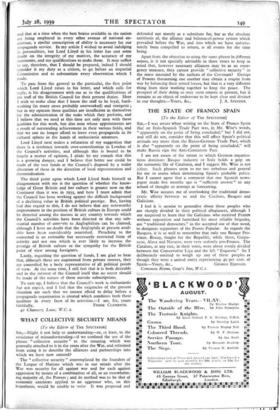WHAT COLLECTIVE SECURITY MEANS
[To the Editor of THE SPECTATOR]
Sra,—Might it not help to understanding—or, at least, to the avoidance of misunderstanding—if we confined the use of the phrase "collective security" to the meaning which was generally attached to it in the years after the War, and refrained from using it to describe the alliances and partnerships into which we have now entered?
The "collective security" contemplated by the founders of the League of Nations which was in our minds after the War was security for all against war and for each against aggression by means of a combination of all, or an overwhelm- ing majority of, the Powers ; and its method was to be that of economic sanctions applied to an aggressor who, on this hypothesis, would be unable to resist It was proposed and defended not merely as a substitute for, but as the absolute antithesis of, the alliance and balance-of-power system which prevailed before the War, and into which we have unfortu- nately been compelled to return, at all events for the time being.
Apart from the objection to using the same phrase in different senses, is it not specially advisable in these times to keep in mind that, however necessary alliances may be as an emer- gency measure, they cannot provide collective security" in the sense intended by the authors of the Covenant? Groups of Powers threatening one another may obtain a respite from war by balancing their armed forces, but that is a very different thing from their working together to keep the peace. The prospect of their doing so may seem remote at present, but it remains as an object of endeavour to be kept clear and distinct
in our thoughts.—Yours, &c., J. A SPENDER.








































 Previous page
Previous page